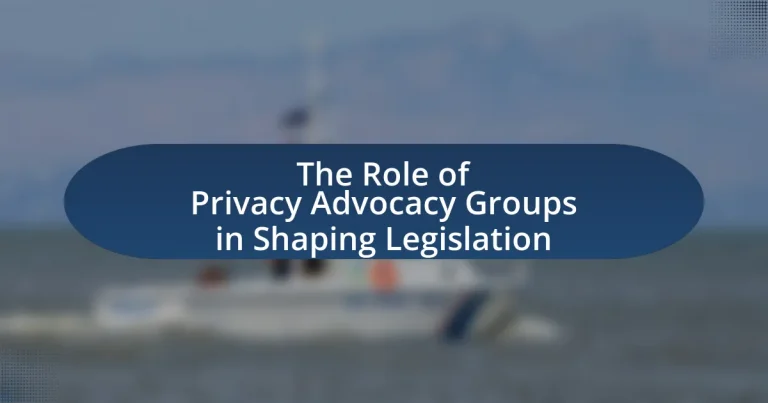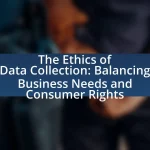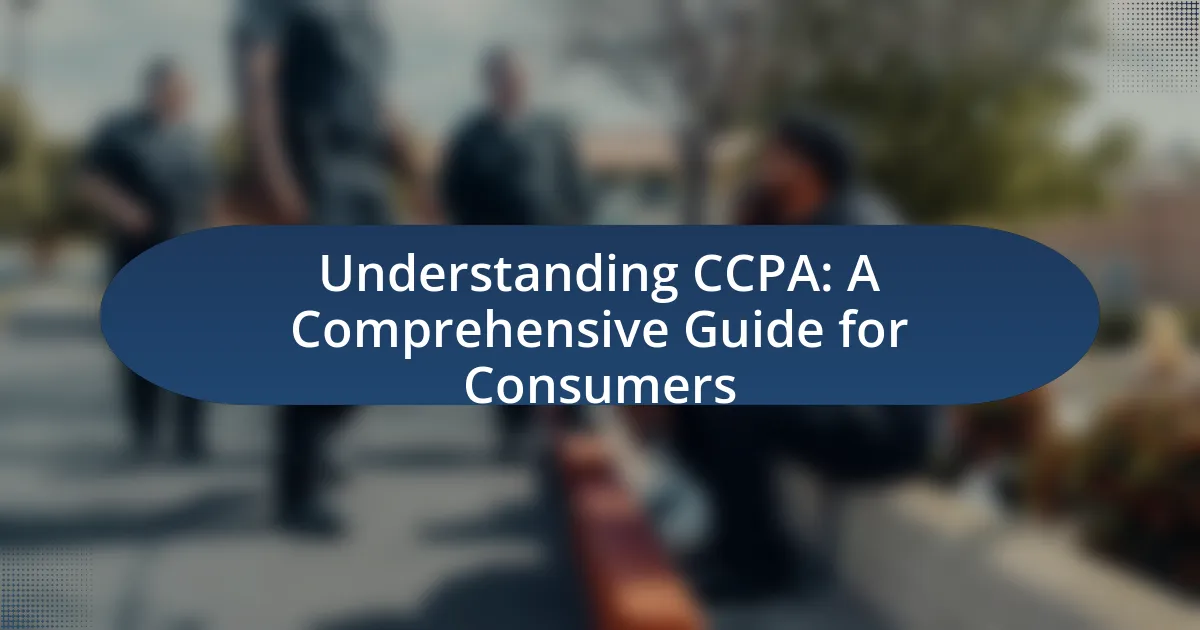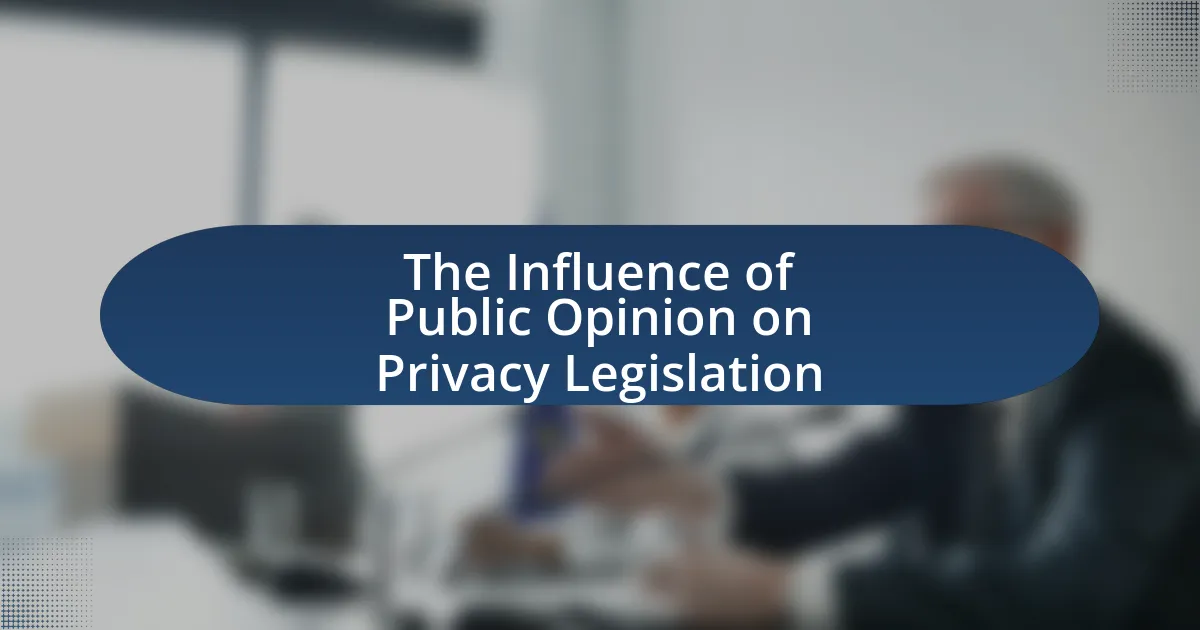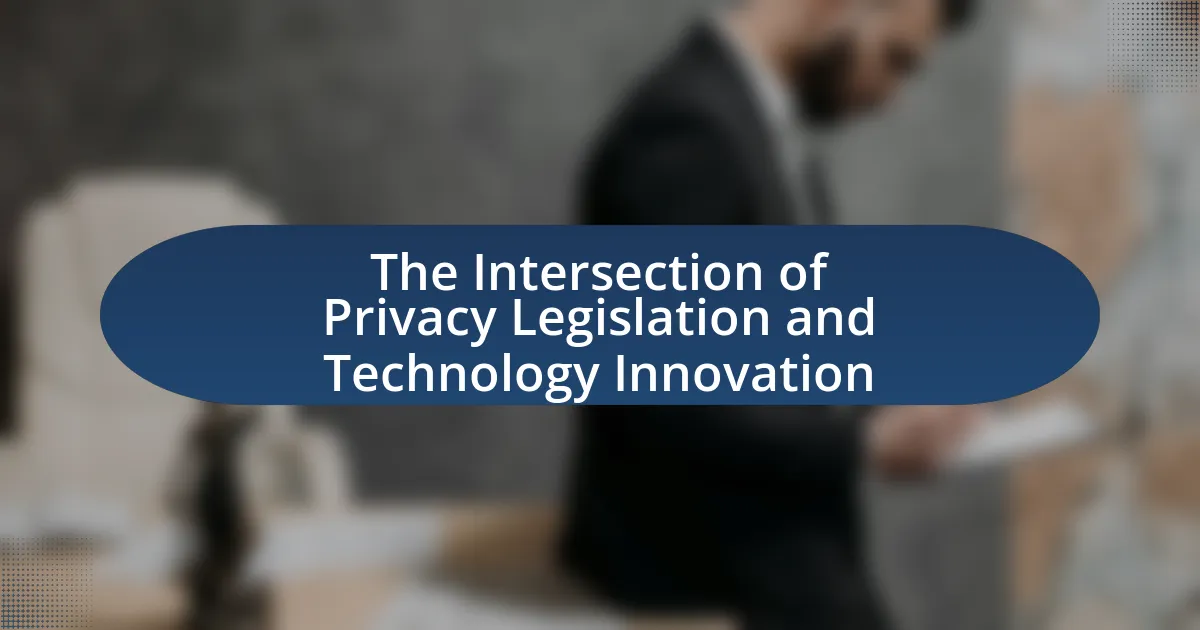Privacy advocacy groups are essential entities in the legislative landscape, significantly influencing policy-making and promoting stronger privacy protections. These organizations, such as the Electronic Frontier Foundation and the American Civil Liberties Union, engage in lobbying, public awareness campaigns, and litigation to advocate for individual privacy rights. They face challenges including political resistance and limited public awareness, yet their efforts have led to notable legislative advancements like the California Consumer Privacy Act and the General Data Protection Regulation. By educating the public and collaborating with lawmakers, these groups strive to ensure responsible data handling and safeguard civil liberties in an increasingly digital world.
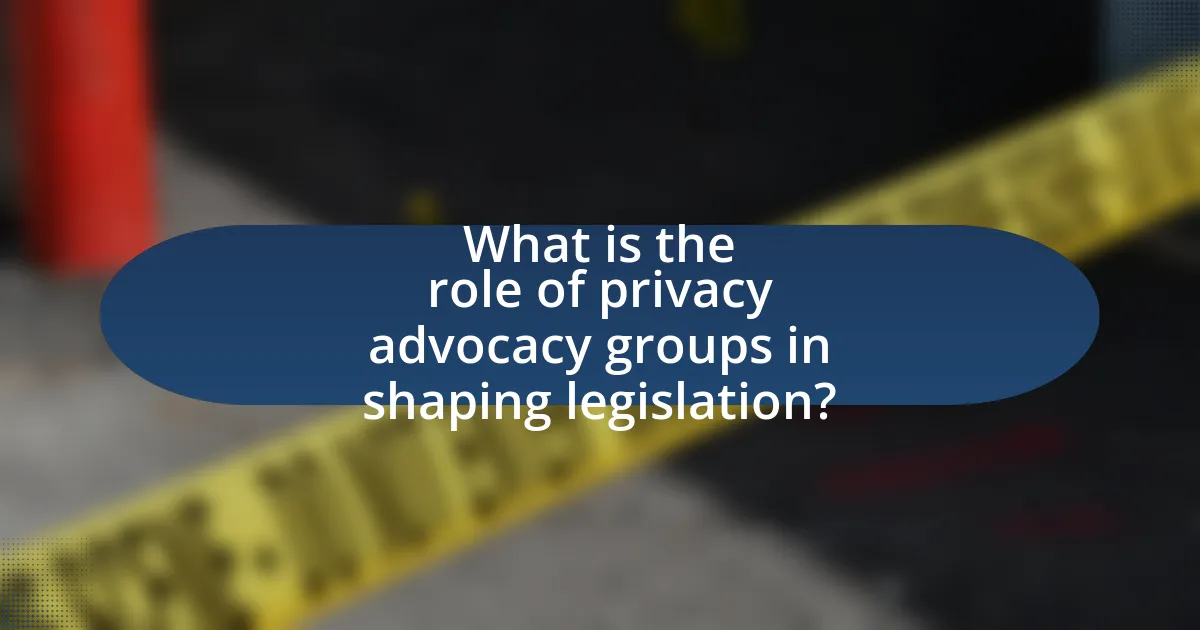
What is the role of privacy advocacy groups in shaping legislation?
Privacy advocacy groups play a crucial role in shaping legislation by influencing policymakers and raising public awareness about privacy issues. These organizations engage in lobbying efforts, provide expert testimony, and mobilize grassroots campaigns to advocate for stronger privacy protections. For instance, the Electronic Frontier Foundation has been instrumental in promoting laws like the California Consumer Privacy Act, which enhances consumer rights regarding personal data. Their activities often lead to the introduction of new bills and amendments that reflect the concerns of citizens regarding data privacy and surveillance.
How do privacy advocacy groups influence policy-making?
Privacy advocacy groups influence policy-making by actively engaging in lobbying efforts, public awareness campaigns, and providing expert testimony to lawmakers. These organizations, such as the Electronic Frontier Foundation and the American Civil Liberties Union, mobilize public opinion to highlight privacy issues, thereby pressuring legislators to consider privacy protections in new laws. For instance, the introduction of the California Consumer Privacy Act in 2018 was significantly influenced by advocacy efforts that underscored the need for stronger consumer data protections. Their research and policy recommendations often serve as critical resources for lawmakers, shaping the legislative agenda around privacy issues.
What strategies do these groups use to advocate for privacy rights?
Privacy advocacy groups employ several strategies to advocate for privacy rights, including public awareness campaigns, lobbying for legislative changes, and engaging in litigation. Public awareness campaigns educate the public about privacy issues and mobilize grassroots support, exemplified by initiatives like Data Privacy Day. Lobbying efforts involve direct interaction with lawmakers to influence policy decisions, as seen in the advocacy for the General Data Protection Regulation (GDPR) in Europe. Additionally, litigation serves as a tool to challenge laws or practices that infringe on privacy rights, demonstrated by cases like the ACLU’s legal actions against government surveillance programs. These strategies collectively aim to shape legislation and protect individual privacy rights effectively.
How do they engage with lawmakers and stakeholders?
Privacy advocacy groups engage with lawmakers and stakeholders through direct lobbying, public campaigns, and collaborative initiatives. These organizations often meet with legislators to discuss privacy issues, provide expert testimony during hearings, and submit policy recommendations. For instance, the Electronic Frontier Foundation frequently collaborates with lawmakers to draft legislation that protects digital privacy rights, demonstrating their active role in shaping policy. Additionally, they mobilize public support through awareness campaigns, which can influence legislative priorities and stakeholder positions on privacy matters.
Why are privacy advocacy groups important in today’s digital landscape?
Privacy advocacy groups are crucial in today’s digital landscape because they protect individuals’ rights and promote transparency in data usage. These organizations raise awareness about privacy issues, influence public policy, and hold corporations accountable for data practices. For instance, the Electronic Frontier Foundation has played a significant role in advocating for stronger privacy laws, contributing to the development of legislation like the California Consumer Privacy Act. Their efforts help ensure that personal data is handled responsibly, fostering trust in digital platforms and safeguarding civil liberties.
What challenges do they face in promoting privacy legislation?
Privacy advocacy groups face significant challenges in promoting privacy legislation, primarily due to political resistance and public awareness issues. Political resistance often stems from lobbying efforts by large corporations that prioritize profit over privacy, which can lead to legislative inertia or opposition to proposed laws. Additionally, many citizens lack a comprehensive understanding of privacy issues, making it difficult for advocacy groups to mobilize public support and pressure lawmakers effectively. According to a 2021 survey by the Pew Research Center, only 48% of Americans feel they have a good understanding of how their data is used, highlighting the gap in public awareness that advocacy groups must address to strengthen their legislative efforts.
How do public perceptions of privacy impact their efforts?
Public perceptions of privacy significantly influence the efforts of privacy advocacy groups in shaping legislation. When the public prioritizes privacy, advocacy groups gain momentum and leverage to push for stronger privacy protections, as seen in the widespread support for the General Data Protection Regulation (GDPR) in Europe, which was driven by heightened public concern over data privacy. Conversely, if the public is indifferent or unaware of privacy issues, advocacy efforts may struggle to gain traction, leading to weaker legislative outcomes. This dynamic is evident in surveys indicating that 79% of Americans express concern about how their data is used, which empowers advocacy groups to demand more stringent regulations and accountability from corporations and governments.
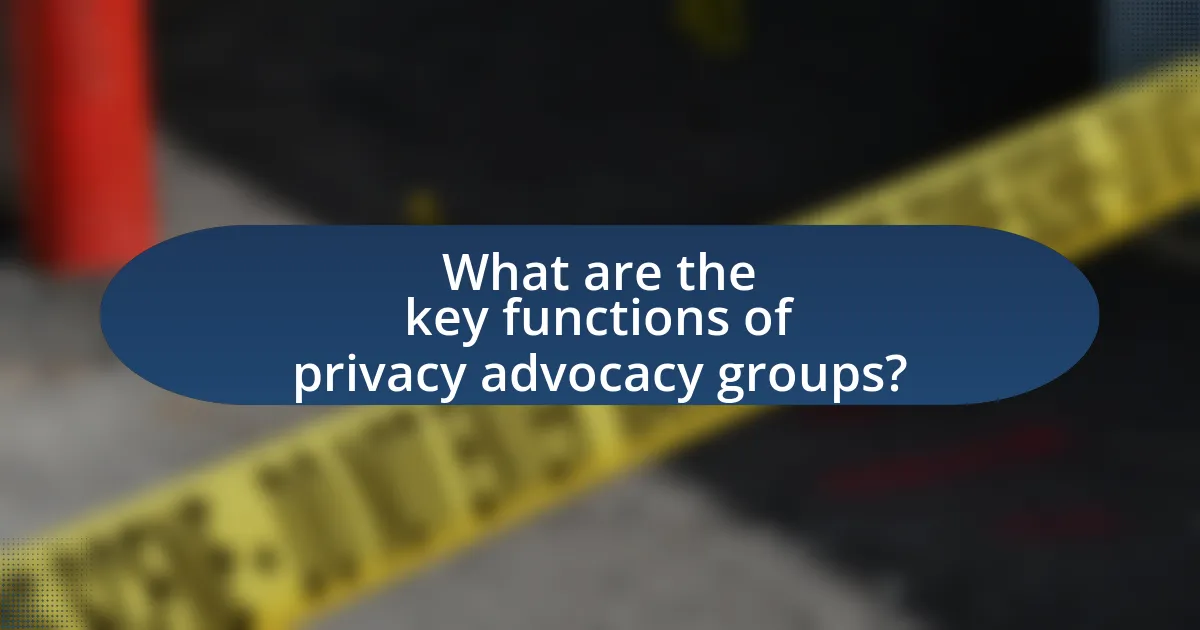
What are the key functions of privacy advocacy groups?
Privacy advocacy groups primarily function to promote and protect individuals’ rights to privacy. They engage in activities such as lobbying for stronger privacy laws, educating the public about privacy issues, and holding corporations and governments accountable for data practices. For instance, organizations like the Electronic Frontier Foundation have successfully influenced legislation, such as the California Consumer Privacy Act, by advocating for consumer rights and transparency in data handling. These groups also conduct research and publish reports that highlight privacy risks, thereby raising awareness and informing policy discussions.
How do these groups educate the public about privacy issues?
Privacy advocacy groups educate the public about privacy issues through awareness campaigns, educational resources, and community engagement initiatives. These groups often create informative materials such as brochures, websites, and social media content that explain privacy rights and the implications of data collection. For instance, organizations like the Electronic Frontier Foundation provide detailed guides on digital privacy practices, helping individuals understand how to protect their personal information online. Additionally, these groups host workshops and seminars to engage directly with communities, fostering discussions about privacy legislation and its impact on citizens. This multifaceted approach ensures that the public is informed about their rights and the importance of privacy in the digital age.
What resources do they provide to raise awareness?
Privacy advocacy groups provide educational materials, toolkits, and online campaigns to raise awareness about privacy issues. These resources often include guides on data protection rights, infographics explaining privacy laws, and social media campaigns aimed at informing the public about the importance of privacy. For example, organizations like the Electronic Frontier Foundation offer comprehensive resources that detail how individuals can protect their personal information online, thereby empowering citizens to advocate for stronger privacy protections.
How do they mobilize community support for privacy initiatives?
Privacy advocacy groups mobilize community support for privacy initiatives by engaging in grassroots campaigns, leveraging social media, and organizing public events. These organizations often conduct awareness programs that educate the community about privacy rights and the implications of surveillance, which fosters a sense of urgency and collective action. For instance, the Electronic Frontier Foundation (EFF) has successfully mobilized support through online petitions and community forums, resulting in significant public participation in legislative processes. Additionally, studies show that community engagement increases when advocacy groups provide clear, actionable steps for individuals to take, such as contacting legislators or participating in local discussions about privacy policies.
What role do privacy advocacy groups play in legal reforms?
Privacy advocacy groups play a crucial role in legal reforms by influencing policy decisions and promoting stronger privacy protections. These organizations engage in lobbying efforts, raise public awareness, and provide expert testimony to lawmakers, thereby shaping the legislative agenda. For instance, the Electronic Frontier Foundation has successfully advocated for the introduction of privacy laws like the California Consumer Privacy Act, which enhances consumer rights regarding personal data. Their efforts often lead to the introduction of bills that address privacy concerns, reflecting the growing demand for data protection in the digital age.
How do they contribute to drafting and amending legislation?
Privacy advocacy groups contribute to drafting and amending legislation by providing expert analysis, stakeholder feedback, and public awareness campaigns. These organizations often engage in consultations with lawmakers, offering insights on privacy implications and potential impacts of proposed laws. For example, the Electronic Frontier Foundation has actively participated in legislative discussions, influencing the development of laws like the California Consumer Privacy Act by advocating for stronger consumer protections. Their involvement ensures that privacy concerns are integrated into the legislative process, ultimately shaping more effective and comprehensive privacy laws.
What examples exist of successful legislative changes driven by these groups?
Successful legislative changes driven by privacy advocacy groups include the enactment of the General Data Protection Regulation (GDPR) in the European Union and the California Consumer Privacy Act (CCPA) in the United States. The GDPR, which took effect in May 2018, was influenced by extensive lobbying from organizations like the Electronic Frontier Foundation and Privacy International, aiming to enhance data protection and privacy rights for individuals. The CCPA, effective January 2020, was significantly shaped by the advocacy of groups such as the California Privacy Rights Coalition, which sought to provide consumers with greater control over their personal information. Both pieces of legislation represent substantial advancements in privacy rights, reflecting the successful efforts of these advocacy groups to influence policy and protect individual privacy.

What are the challenges faced by privacy advocacy groups?
Privacy advocacy groups face significant challenges, including limited funding, political resistance, and public awareness issues. Limited funding restricts their ability to conduct research, engage in lobbying, and run awareness campaigns, which are essential for influencing legislation. Political resistance often arises from powerful corporate interests that prioritize profit over privacy, making it difficult for these groups to advocate for stronger privacy protections. Additionally, public awareness issues hinder their efforts, as many individuals remain uninformed about privacy rights and the implications of data collection, reducing public support for advocacy initiatives. These challenges collectively impede the effectiveness of privacy advocacy groups in shaping legislation.
How do funding and resources affect their effectiveness?
Funding and resources significantly enhance the effectiveness of privacy advocacy groups in shaping legislation. Adequate financial support allows these organizations to conduct comprehensive research, engage in public awareness campaigns, and employ skilled personnel, all of which are crucial for influencing policy decisions. For instance, a study by the Pew Research Center found that organizations with higher funding levels are more likely to successfully lobby for legislative changes, as they can mobilize resources for strategic initiatives and outreach efforts. Additionally, access to resources enables these groups to collaborate with legal experts and policymakers, further amplifying their impact on privacy legislation.
What are the implications of limited funding on advocacy efforts?
Limited funding significantly hampers advocacy efforts by restricting resources necessary for effective campaigning and outreach. Advocacy groups often rely on financial support to conduct research, mobilize communities, and influence policymakers. For instance, a study by the National Council of Nonprofits indicates that organizations with limited budgets struggle to maintain staff, which directly affects their capacity to engage in sustained advocacy efforts. Consequently, reduced funding leads to diminished visibility and impact, making it challenging for these groups to compete with well-funded interests in legislative discussions.
How do they prioritize issues with constrained resources?
Privacy advocacy groups prioritize issues with constrained resources by assessing the potential impact of each issue on public privacy rights and selecting those that align with their strategic goals. They often conduct research to identify the most pressing privacy concerns, analyze legislative proposals, and engage with stakeholders to gauge public sentiment. For instance, groups may prioritize issues that affect large populations or have significant implications for data protection, such as surveillance practices or data breaches. This targeted approach allows them to allocate limited resources effectively, focusing on high-impact initiatives that can drive meaningful change in legislation.
What strategies can privacy advocacy groups employ to overcome obstacles?
Privacy advocacy groups can employ strategies such as coalition building, public awareness campaigns, and legal challenges to overcome obstacles. Coalition building allows these groups to unite with other organizations, amplifying their voice and resources, which has been effective in influencing legislation, as seen in the formation of the Electronic Frontier Foundation. Public awareness campaigns educate the public on privacy issues, mobilizing grassroots support that can pressure lawmakers to act, exemplified by the widespread support for the General Data Protection Regulation in Europe. Legal challenges can also be employed to contest unjust laws or practices, as demonstrated by various lawsuits against government surveillance programs, which have led to significant legal precedents.
How can collaboration with other organizations enhance their impact?
Collaboration with other organizations can enhance the impact of privacy advocacy groups by pooling resources, expertise, and networks to create a stronger collective voice. When privacy advocacy groups partner with technology firms, legal experts, and civil society organizations, they can leverage diverse perspectives and skills to address complex privacy issues more effectively. For instance, a study by the Berkman Klein Center for Internet & Society at Harvard University highlights that collaborative efforts can lead to more comprehensive policy recommendations and increased public awareness, ultimately influencing legislative outcomes. This synergy not only amplifies advocacy efforts but also fosters innovative solutions to privacy challenges, demonstrating the tangible benefits of collaboration in shaping effective legislation.
What best practices can they adopt to strengthen their advocacy efforts?
Privacy advocacy groups can strengthen their advocacy efforts by employing strategic communication, building coalitions, and leveraging data-driven arguments. Strategic communication involves crafting clear, compelling messages that resonate with the public and policymakers, as evidenced by successful campaigns that have mobilized grassroots support. Building coalitions with other organizations amplifies their voice and resources, demonstrated by the effectiveness of alliances in past legislative battles, such as the coalition that successfully advocated for the California Consumer Privacy Act. Leveraging data-driven arguments, including statistics on public opinion and case studies of privacy violations, provides a factual basis for their claims, enhancing credibility and persuading stakeholders.
What can individuals do to support privacy advocacy groups?
Individuals can support privacy advocacy groups by donating funds, volunteering time, and raising awareness about privacy issues. Financial contributions enable these organizations to conduct research, lobby for legislative changes, and run educational campaigns. For instance, the Electronic Frontier Foundation (EFF) relies on donations to protect civil liberties in the digital world. Volunteering can involve participating in events, helping with outreach, or providing professional skills such as legal or technical expertise. Additionally, individuals can amplify the message by sharing information on social media, engaging in discussions, and encouraging others to prioritize privacy rights, which can lead to greater public support and influence on policymakers.
